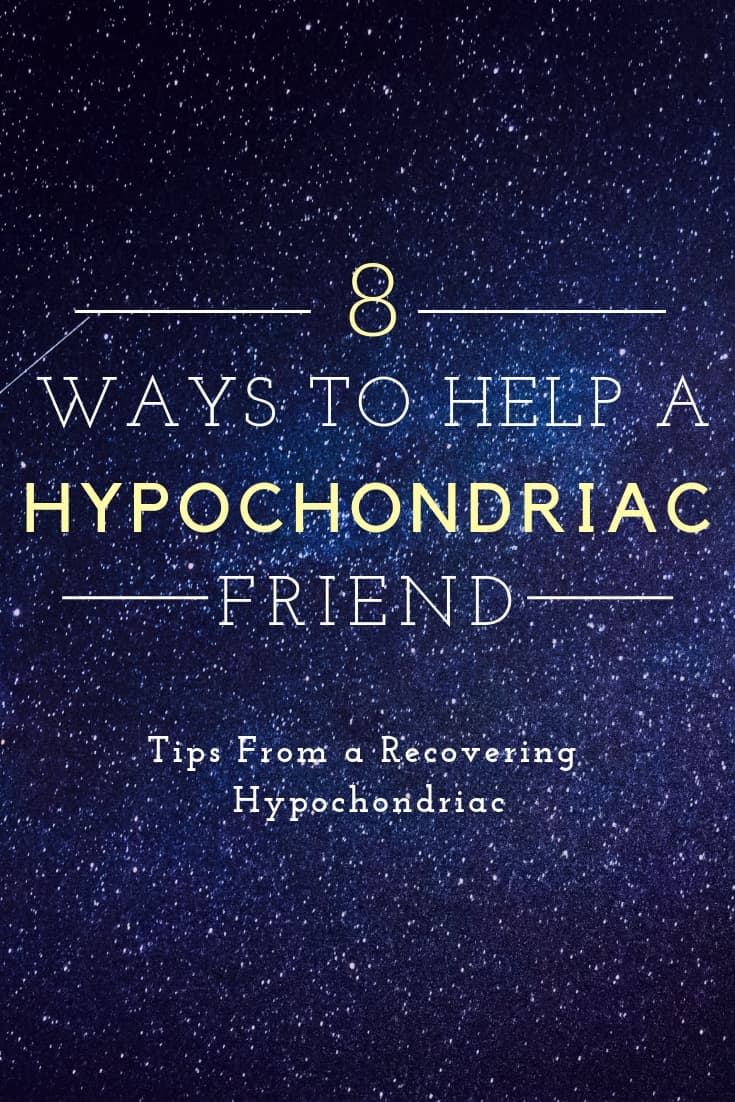I really struggled with what to put in this post. Largely because, looking back on my deep-down hypochondriac days, I thought that there could never be something that could help ease my anxieties. After all, in my mind, I was dying from a dreaded illness. But I didn’t have a diagnosis. I mean, even perfect medical check-ups by doctors couldn’t convince me that I wasn’t dying. How could a friend or random colleague ever help?
So, use your judgment when trying to implement these techniques. Recognize that, in trying to help your hypochondriac friend, they might not be receptive to these things. But, learning what I have in the past two years about health anxiety and hypochondria, this is what I’ve got:
- Recognize that their symptoms are real. Those of us that suffer from health anxiety are not making up our symptoms. We genuinely feel that chest pain, or that constant headache, or that dull burning in our abdomen. And, those of us that suffer from health anxiety think the worst of those symptoms. That chest pain? Heart attack or a pulmonary embolism. That headache? A sign of a brain tumor. And that dull abdomen burning? We think it’s colon cancer, for sure.
- Learn more about health anxiety and obsessive compulsive disorders. As I learned in therapy, my health anxiety was actually an obsessive compulsive disorder. I never thought of myself as having OCD though, because I didn’t have any of the “stereotypical” OCD signs. For example, I did not repeatedly wash my hands (in other words, I was not a germophobe). But, I learned that there was a condition called “Primarily Obsessional” OCD, which explained a lot of the “anxious” thoughts in my head. They were actually obsessive thoughts. Plus, as I learned, I did have lots of compulsions. There were two books that my therapist recommended during my first few appointments.
In the OCD Workbook, each chapter actually has a section for the friends and family of OCD sufferers, and what they can do for help. There is also an entire chapter dedicated to Health Anxiety specifically. However, I found the majority of the chapters, not just the Health Anxiety ones, to be extremely helpful. Additionally, one of the other books that my therapist recommended was Coping with Anxiety
. That book gives phenomenal tips on how to recognize anxious thoughts and methods to put a stop to them.
Free 30 Day Guide to Improving
Health Anxiety Symptoms
Manageable daily tasks you can try for the next 30 days to kickstart your path to overcoming hypochondria & health anxiety.
- Recognize that rational explanations are not likely to help. No matter how helpful you think they might be, providing rational explanations or statistics is not going to help someone with health anxiety. For example, if a 25-year-old health anxiety sufferer things they’re having a stroke, telling them that it’s very rare to have a stroke at that age is likely not going to help. I learned in therapy that, in moments of anxiety, the brain is not receptive of rational explanations, because we are in “fight or flight” mode. I talk about this more in a separate post on our “lizard brains” and how they perpetuate anxiety.
- Explain that their anxieties can be eased. They do not need to live in fear of some deadly ailment. However, easing those anxieties might require therapy. Luckily, CBT is shown to be highly effective in treating health anxiety. If it’s someone you’re close to, perhaps research some nearby therapists that specializes in CBT.
- Show them my blog. Show them that someone who was a hypochondriac for ten years sought help and was able to bring her anxieties under control in just a few months. Those few months were life changing for me.
- Don’t provide reassurances. Although providing reassurance sounds like a kind and caring thing to do, providing reassurance to a health anxiety sufferer is actually detrimental. The OCD Workbook
I mentioned earlier covers what to do when the sufferer is seeking reassurances.
- Get some light activity and exercise with your friend. Exercise has been shown to improve symptoms of anxiety. I’m not necessarily talking a big gym workout with your hypochondriac friend, but offer to go on a weekend hike on some easy local trails. Or, just a walk around the mall. And, be kind but assertive if your hypochondriac friend tries to cancel on you. I can’t tell you how many times I tried to back out on plans I had made because I started to get some mysterious stomach ailment or headache. All I wanted to do was stay at home and ruminate over my symptoms. And, frankly, that never helped anything or anyone. So, even if they are insistent about canceling plans to go out, try to go over to their house to see them. Maybe bring a board game or a puzzle to help take their mind off things for a while. You can also check out my gift guide for health anxiety sufferers.
- Is your friend a doctor avoider? If so, offer to go to an appointment with them. In my research on health anxiety and hypochondria, I’ve found that we typically fall into one of two categories – Doctor Avoiders or Doctor Frequenters. I was a doctor avoider for many years, and it compounded my anxiety as time progressed. If someone has confided in you that they’re scared of going to the doctor, offer to go with them!
Have you had to deal with a hypochondriac friend? What are your tips?

Want email notifications when I publish a new post? Sign up below!

